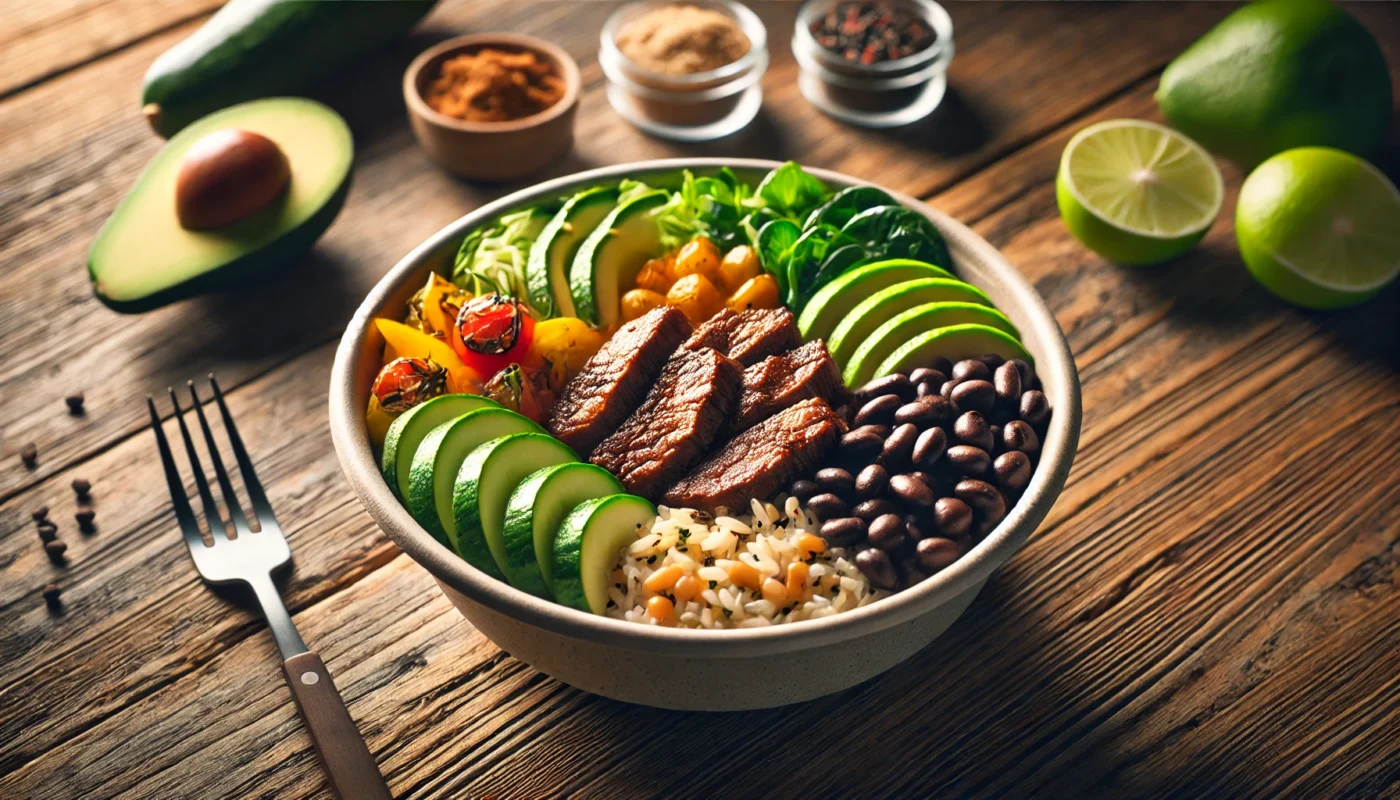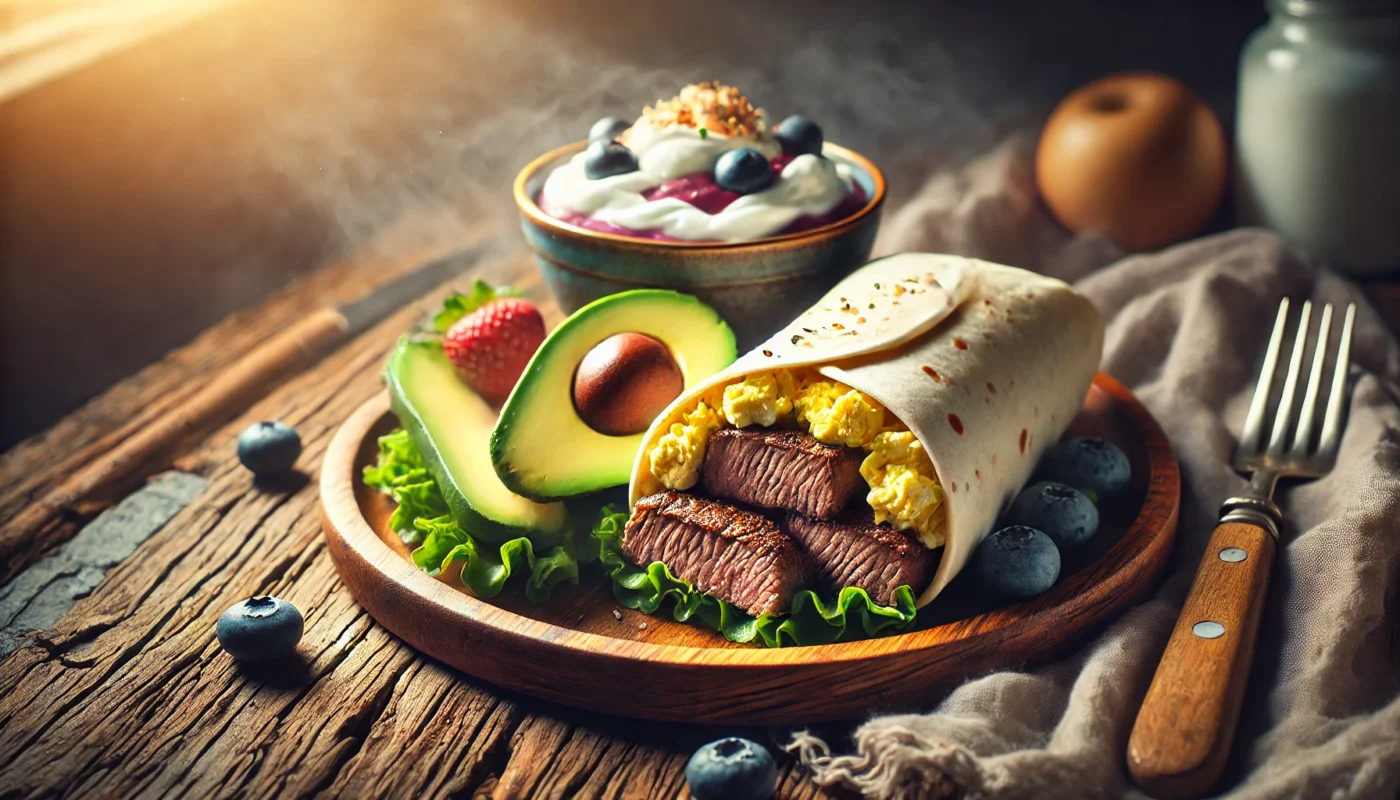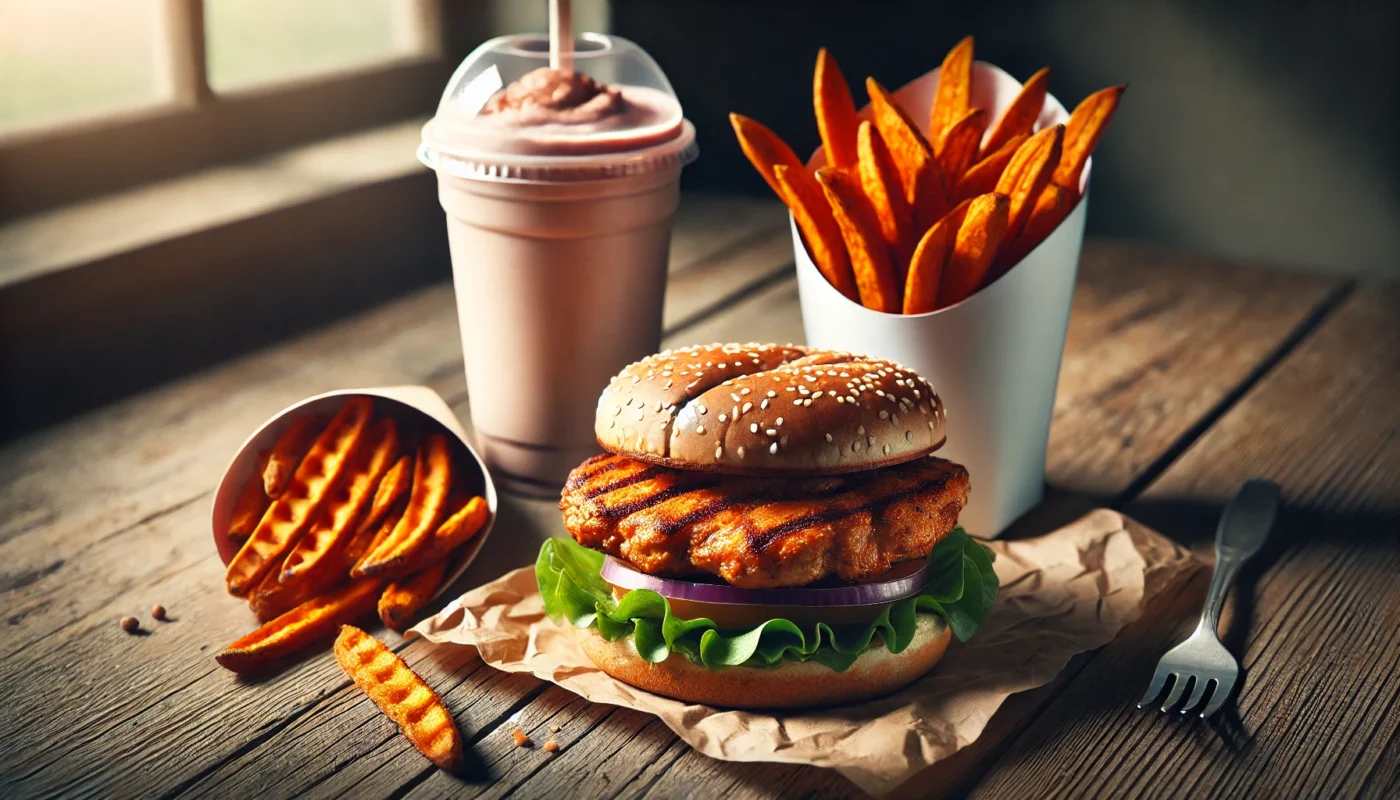In this article, we’ll explore protein-rich fast food options, delve into their nutritional value, and offer practical advice for making informed choices. This guide is designed to help you achieve optimal muscle gain, even in the fast-paced world of fast food.
You may also like: High Protein Foods to Fuel Workouts

Understanding Fast Food Nutrition
Fast food often carries a reputation for being unhealthy, but not all menu items are created equal. When evaluating fast food options, it’s crucial to focus on their macronutrient composition, particularly protein content. Protein is the cornerstone of muscle repair and growth, making it an essential component for lifters.
The Importance of Macronutrients
Macronutrients, comprising proteins, carbohydrates, and fats, are crucial for overall health and performance. For lifters, a balanced intake of these nutrients supports energy levels and muscle synthesis. Fast food doesn’t always mean sacrificing macronutrient balance; understanding how to identify and combine these nutrients can optimize your dietary choices.
Protein’s Role in Muscle Building
Protein is not only essential for repairing muscle tissue but also for promoting muscle growth. It provides the necessary amino acids that serve as building blocks for new muscle fibers. Lifters require a higher protein intake than the average person, and fast food can surprisingly meet these needs with the right selections.
Evaluating Fast Food Nutritional Labels
Most fast-food chains offer detailed nutritional information, either in-store or online. Learning to read and interpret these labels can empower you to make healthier choices. Focus on meals with high protein content and moderate levels of fats and carbohydrates to align with muscle-building goals.
Protein-Rich Fast Food Options
When considering fast food, look for meals that emphasize lean proteins. Grilled chicken sandwiches, turkey burgers, and salads with protein-rich toppings like chicken or beans are excellent choices. These options typically offer higher protein content while minimizing unhealthy fats and excessive carbohydrates.
Grilled Chicken Offerings
Grilled chicken sandwiches are a staple for protein seekers, offering a lean source of protein without the additional fats found in fried options. These sandwiches are often paired with whole-grain buns and fresh vegetables, enhancing their nutritional profile. Opt for chains that offer customizable grilled chicken meals to better fit your dietary needs.
Innovative Protein Salads
Salads have evolved beyond just greens; they now include a variety of protein-packed ingredients. Choose salads that incorporate grilled chicken, beans, or quinoa for an extra protein boost. These additions not only enhance the flavor but also significantly increase the protein content, making salads a viable meal option for muscle growth.
Exploring Plant-Based Proteins
Fast food chains are increasingly offering plant-based protein options, such as black bean burgers or tofu salads. These alternatives are not only rich in protein but also provide essential nutrients and fiber. For lifters who prefer plant-based diets, these options can effectively support muscle-building goals.
Best Fast Food for Muscle Gain
For muscle gain, the objective is to maximize protein intake while managing caloric consumption. Fast food chains have increasingly expanded their menus to include items specifically targeting health-conscious consumers. Here are some top picks for muscle-building fast food:
The Rise of Protein Wraps
Wraps are becoming a popular choice for those seeking a balanced meal with a high protein content. Many fast-food chains offer wraps filled with lean meats, beans, and vegetables. Customizing these wraps with additional protein-rich ingredients can further enhance their nutritional value.
Egg-based Breakfast Innovations
Breakfast is a critical meal for muscle-building, and fast-food chains are capitalizing on this by offering egg-based options. Egg white sandwiches, omelets, and breakfast bowls can provide a substantial amount of protein. Pair these with whole-grain sides for a well-rounded, muscle-supporting breakfast.
Customizable Protein Bowls
Protein bowls offer a versatile and customizable meal option that can be tailored to your specific dietary needs. These bowls typically include a base of grains or greens, topped with various protein sources like chicken, beef, or legumes. Adding extra vegetables and legumes can further boost the fiber and protein content.

High Protein Fast Food Choices
Fast food is not inherently synonymous with poor nutrition. With a discerning approach, you can find high-protein meals that support your lifting regimen.
Customizing Your Order
One of the most effective strategies for ensuring a meal meets your nutritional needs is customization. Don’t hesitate to modify your order to boost its protein profile. Request extra meat, substitute high-fat dressings with lighter options, or add a side of nuts or yogurt to increase protein content.
Maximizing Protein with Side Options
In addition to choosing high-protein main dishes, consider supplementing your meal with protein-rich sides. Many fast-food outlets offer side salads, beans, or legumes that can complement your main order. These additions not only increase the protein content but also contribute to your daily nutrient intake.
Exploring New Fast Food Trends
The fast-food industry is continually evolving, with trends focusing on healthier and more nutritious options. Stay informed about new menu items or limited-time offerings that emphasize protein and other essential nutrients. Being aware of these trends can help you make more informed and health-conscious choices.
Making Informed Fast Food Choices
The key to integrating fast food into a muscle-building diet lies in making informed choices. Here are some strategies to keep in mind:
Analyze Nutritional Information
Most fast-food chains provide detailed nutritional information online or in-store. Use this data to evaluate options before making a decision. Focus on meals that offer a favorable protein-to-calorie ratio.
Navigating the Menu for Healthy Choices
Understanding how to navigate fast food menus is crucial for making healthy decisions. Look for menu sections labeled as “healthy,” “light,” or “protein-rich” to quickly identify suitable options. Familiarize yourself with the nutritional profiles of regular items to make better choices on the go.
Mind the Add-ons
Beware of add-ons that can sabotage your healthy meal. High-calorie sauces, extra cheese, and sugary beverages can quickly turn a protein-rich meal into a dietary pitfall. Opt for healthier alternatives like mustard, salsa, or vinegar-based dressings.
Portion Control and Balance
Even the healthiest fast food options can contribute to weight gain if consumed in excessive quantities. Pay attention to portion sizes and balance your fast food intake with other meals throughout the day to ensure a well-rounded diet. Consider sharing larger portions or saving half for later to maintain portion control.
Fast Food Nutrition Myths Debunked
Fast food has long been stigmatized as inherently unhealthy, but this narrative is slowly changing. As the industry evolves, many chains are making concerted efforts to cater to health-conscious consumers. By debunking common myths, we can better understand how fast food can fit into a balanced diet:
Myth 1: Fast Food is Always High in Calories
While many fast-food items are calorie-dense, plenty of options offer a balanced nutritional profile without excessive caloric intake. By choosing grilled options, salads, or wraps, you can enjoy a meal that supports your caloric needs without overindulging.
Myth 2: Fast Food Lacks Nutritional Value
This is no longer true across the board. Many chains now provide meals rich in protein, fiber, and essential nutrients. Look for items with whole grains, lean proteins, and a variety of vegetables to ensure a nutrient-dense meal.
Myth 3: Fast Food Can’t Support Fitness Goals
With strategic choices, fast food can complement a muscle-building diet. The key is to prioritize protein and be mindful of overall nutritional content. By focusing on nutrient-rich options, you can incorporate fast food into your routine without compromising your fitness objectives.

Conclusion
Fast food doesn’t have to be the nemesis of a serious lifter. By understanding nutritional content, customizing orders, and making strategic choices, fast food can become a viable option for those seeking to enhance their protein intake and support muscle growth. Remember, the power of informed decision-making can transform fast food from a dietary compromise to a valuable component of your fitness journey.
Ultimately, the goal is to equip you with the knowledge to navigate fast food menus confidently. As you integrate these strategies into your routine, you’ll find that fast food can indeed align with your muscle-building goals, providing both convenience and nutrition.
By embracing informed choices and staying aware of new trends, you can enjoy the benefits of fast food while keeping your muscle-building objectives on track. With the right approach, fast food can be more than just a convenient option; it can be an integral part of your diet, supporting your fitness and lifestyle goals.
fast food, protein-rich meals, muscle gain, nutrition, macronutrients, healthy eating, fast food options, lifters diet, customizable meals, nutritional labels, meal planning, fitness goals, plant-based proteins, protein salads, fast food myths, informed choices
Further Reading:
Restaurant Rules: The Best Fast Food Options
Will dirty bulking help you build muscle?
Important Note: The information contained in this article is for general informational purposes only, and should not be construed as health or medical advice, nor is it intended to diagnose, prevent, treat, or cure any disease or health condition. Before embarking on any diet, fitness regimen, or program of nutritional supplementation, it is advisable to consult your healthcare professional in order to determine its safety and probable efficacy in terms of your individual state of health.
Regarding Nutritional Supplements Or Other Non-Prescription Health Products: If any nutritional supplements or other non-prescription health products are mentioned in the foregoing article, any claims or statements made about them have not been evaluated by the U.S. Food and Drug Administration, and such nutritional supplements or other health products are not intended to diagnose, treat, cure, or prevent any disease.

